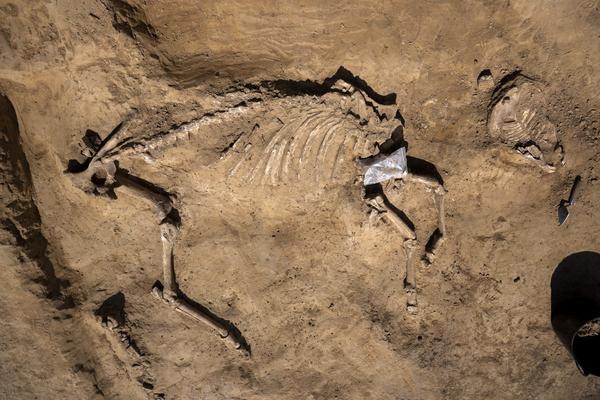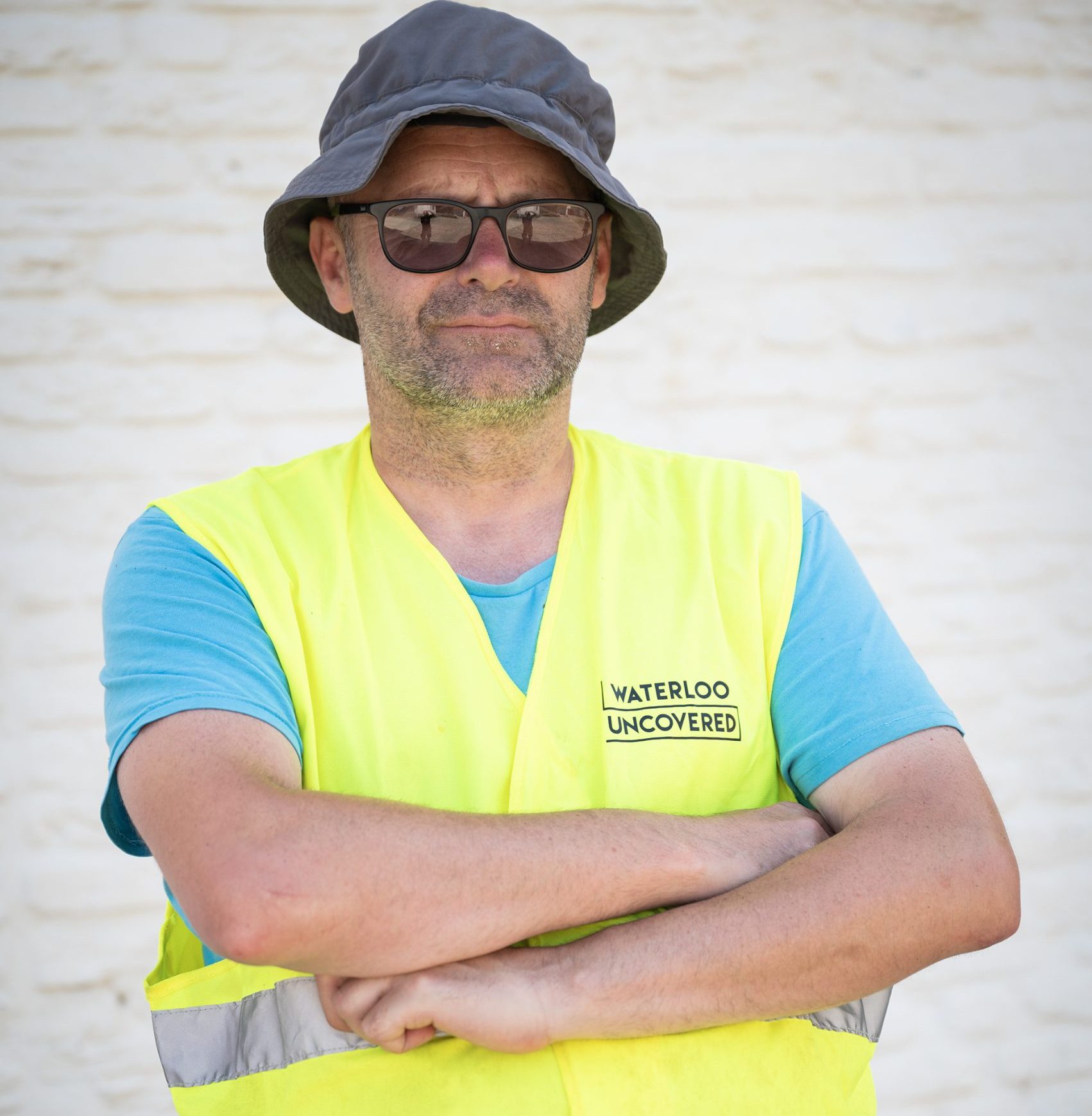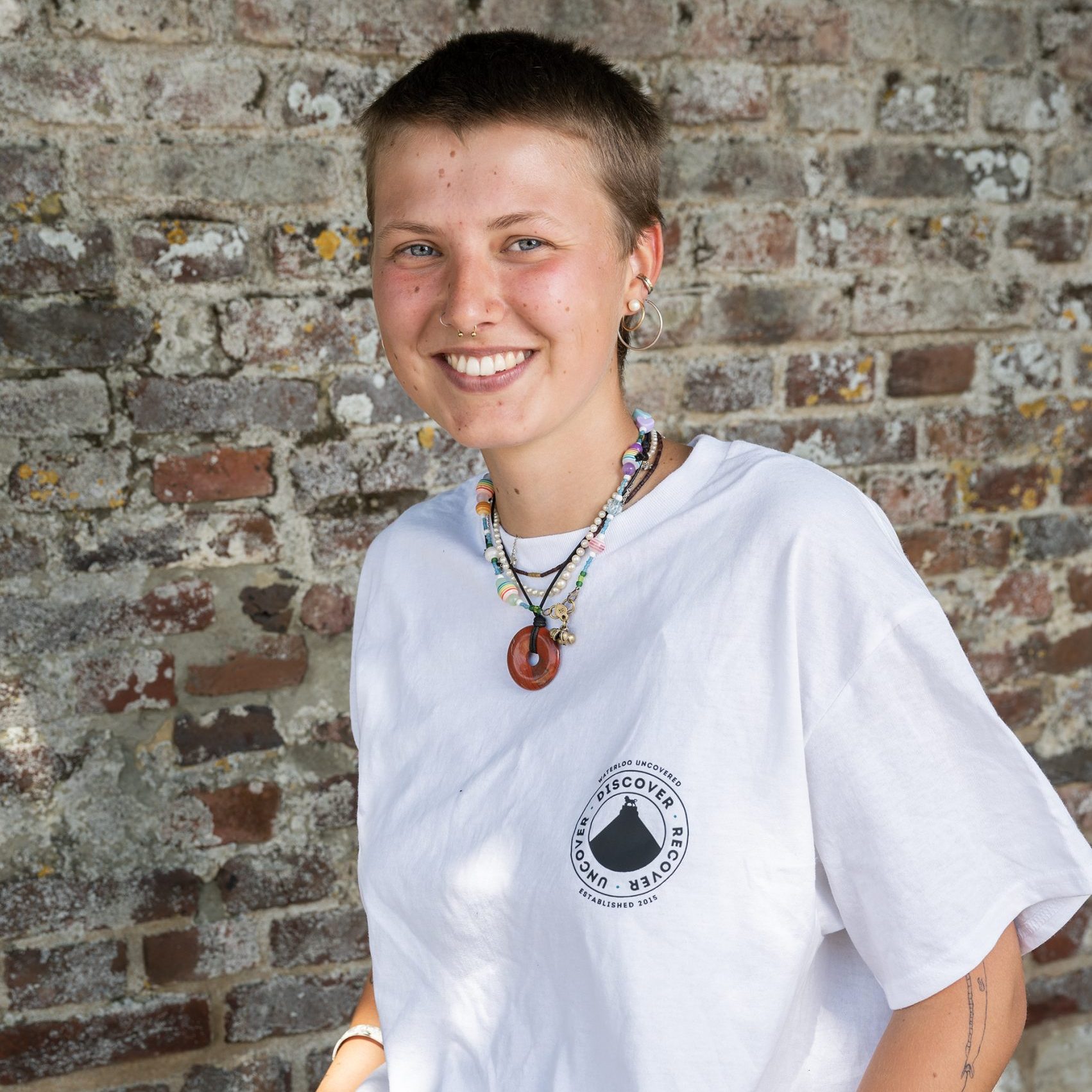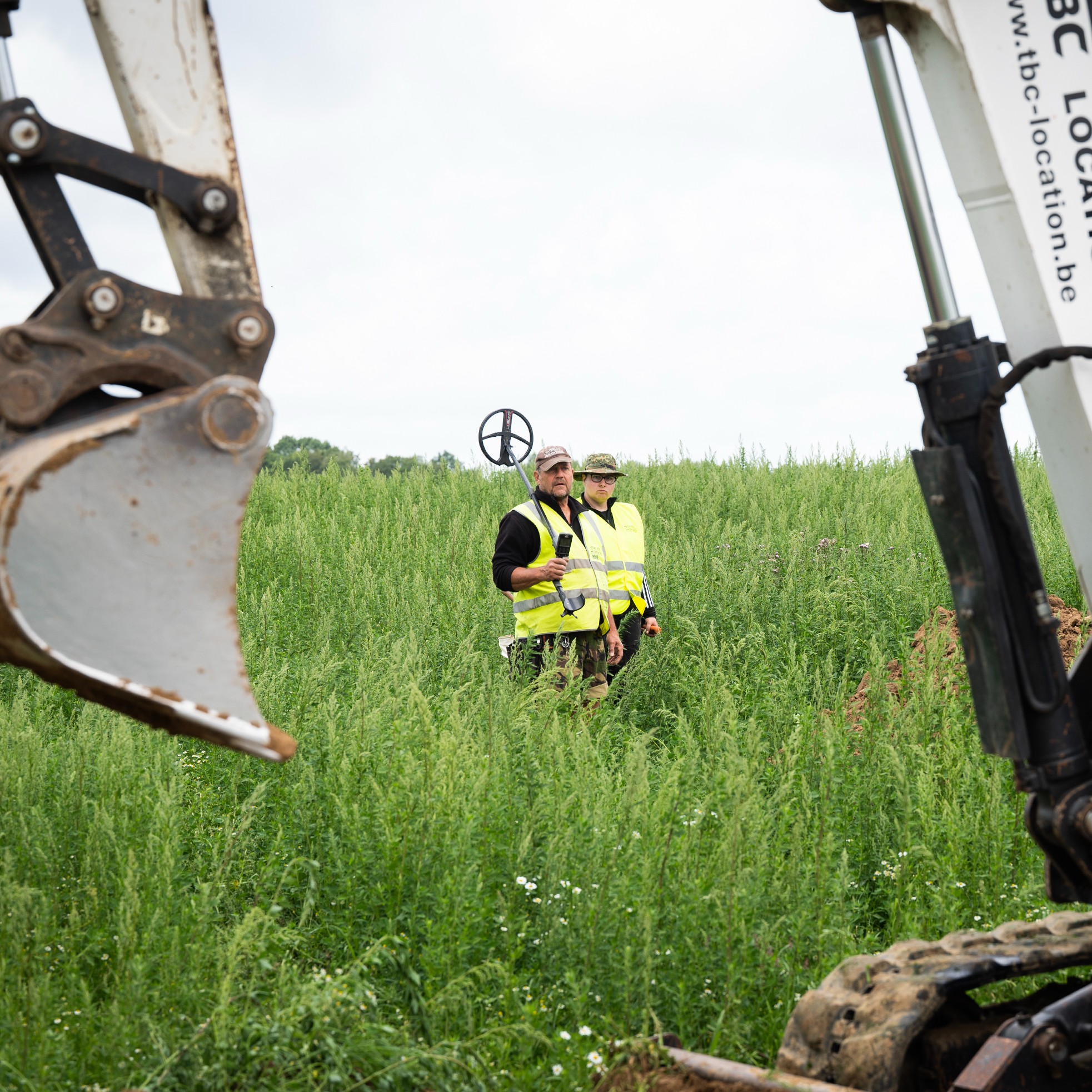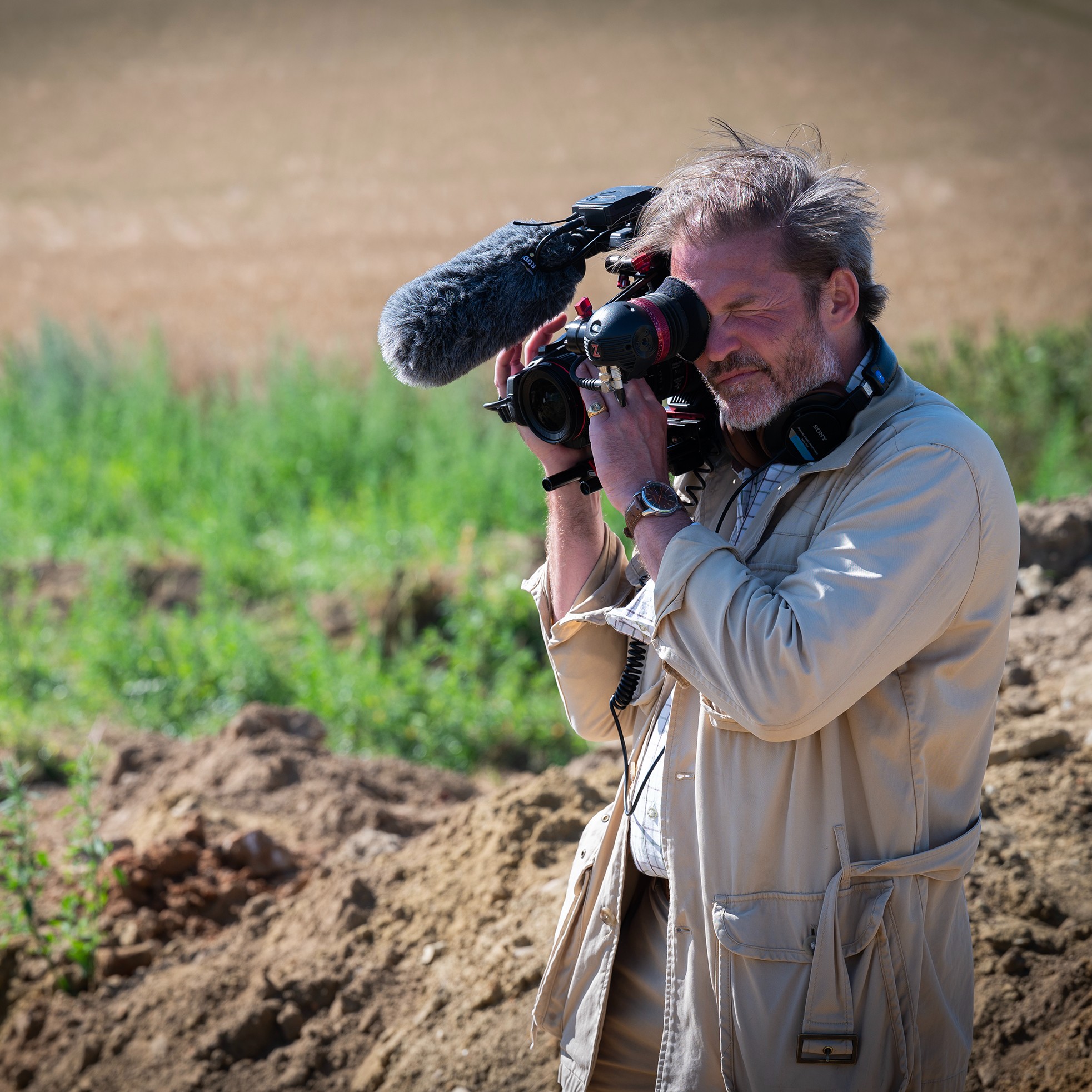Welcome to the latest edition of Waterloo Uncovered’s dig diary
By Hattie Ford
In this edition:
- How coronavirus and lockdown have impacted on archaeology;
- A miniature model of Waterloo with big plans;
- Taxi Charity for Military Veterans rides again!
Coronavirus and Commercial Archaeology
Coronavirus has had an enormously disruptive effect on all of us, and many industries have come to a standstill. But what effect has the virus and lockdown had on archaeology, an industry that requires people to be out in the field, collaborating with others? While some projects – like Waterloo Uncovered’s annual excavation in Belgium – have been put on hold, many archaeologists have had to adjust to the new normal and try their best to carry on.
Alistair Douglas

In his day job Alistair is an archaeologist, Health and Safety Manager and Training Coordinator with Pre-Construct Archaeology. As a military veteran himself, he’s also a member of Waterloo Uncovered’s team of Archaeological Supervisors on our summer digs in Belgium.
Pre-Construct staff who are normally office based have been largely working from home, but those who are typically out in the field are still needed on site. Construction is a key industry, and building projects have had to continue in spite of the virus – and so archaeologists have been carrying on with the job of making sure that sites are investigated before the diggers move in. For an archaeologist like Alistair, that means watching briefs, desk-based assessments and often actual excavation work have all continued – albeit with new challenges to overcome.
Pre-Construct has several offices around the country, but Alistair is based in London, where many of the archaeologists typically commute to site on public transport. This has proved difficult during the pandemic, especially during the first few weeks of the virus, before the government guidance advised non-key workers to begin working from home. To minimise travelling, Pre-Construct have tried to assign staff to the sites they live close to. One benefit from the fact that so many people have taken to working from home, is that public transport is thankfully now safer and less crowded.
On site, health and safety are paramount and regulations are followed to the letter, both in the trenches and in welfare facilities such as canteens. Staff must have their temperature taken upon entering an excavation, and anyone with a high temperature must leave and can’t return until they can provide a negative test result. Archaeologists socially distance as much as possible both in the trench and out of it, although occasionally maintaining regular safety protocols makes this impossible – for example, if a heavy object requires two people to carry it, then two people must still carry it, even if it means they can’t keep 2m distance between them. Where people have to work closely with each other, measures are taken to reduce the risk, such as working side by side instead of face to face.
Winter may bring its own set of challenges, but for now, Alistair and Pre-Construct Archaeology are coping well and trying to keep disruption to a minimum. You can read more about how archaeology has carried on despite the odds in London in an article in the most recent edition of the London Archaeologist journal, which Alistair and other London-based archaeologists have contributed to.
Phil Harding

Phil is well-known for his television work for many years on Time Team, but these days can be found working with Wessex Archaeology, as well as being one of Waterloo Uncovered’s Archaeological Supervisors. In contrast to Alistair, Phil has been working from home throughout lockdown, only occasionally going into the office when necessary. Although he was recently set to visit a site in Dagenham for a watching brief, the project had to be called off at the last minute after someone associated with the excavation unfortunately tested positive for coronavirus. They hope to return to site once they are given the all clear.
There’s still plenty that can be done from home, including research, analysis and report writing, as Phil reminds us: “Archaeology is more than just digging holes!”. And working from home has its advantages – Phil’s wide collection of books is available at his fingertips for research purposes. Currently, Phil is involved in a project to raise the profile of Salisbury’s impressive medieval archaeology through public engagement and education, and has also been kind enough to record a series of Lockdown Lectures for Waterloo Uncovered alongside his work. You can watch Phil’s Lockdown Lectures, as well as lectures by our Archaeological Directors and special guests, in our Lockdown Lectures playlist on YouTube here.
Dr Stuart Eve

Stuart is a founding partner of L-P Archaeology, and one of Waterloo Uncovered’s Archaeological Directors. While L-P Archaeology shut down for around 2 weeks when lockdown was first announced, they were luckily able to return to work soon after, with strict health and safety regulations in place to protect their staff.
Overall, there has been less disruption to L-P than they initially expected. While staff that do not need to be on site are now working from home, the situation for on-site archaeologists is almost “business as usual” – just, Stuart says, “slower and more expensive”. The biggest issues on site are social distancing and finding suitable accommodation. Even in the trenches, archaeologists must try and keep 6 feet between them whenever possible, meaning less people can fit in one trench at a time, and work is slower to complete. Archaeologists must also stay in private apartments or studios close to site, rather than sharing space and facilities such as kitchens and bathrooms in shared accommodation as they normally would, making the process much more difficult to organise and more expensive to execute.
While the commercial archaeology industry is trying to carry on as normal and relatively little disruption has been seen at L-P, Stu thinks there may be an impact on the next generation of the workforce as the most recent cohort of archaeology students find themselves in an unprecedented situation. Academic archaeology has been much more severely affected than commercial archaeology for reasons relating to insurance and risk assessments, and teaching has also been disrupted. Training excavations and field schools have largely been cancelled, and it is much more difficult to run finds handling sessions with students due to the health risks that passing around and touching an object in a group can bring. Post-excavation work on some of Waterloo Uncovered’s 6000 finds, which are stored at L-P Archaeology’s lab, has also been put on hold due to COVID restrictions, although they hope to resume as soon as it is safe to do so.
In response to the virus, L-P Archaeology have designed a new package of free to download resources for archaeologists. The SoDA (Social Distancing for Archaeology) Toolkit, which was funded by Historic England and supported by Prospect Union in collaboration with L-P, includes videos demonstrating safe distancing and hygiene practices, stickers and signage to aid in social distancing onsite, and documents which will help archaeologists conduct risk assessments and communicate health and safety information to staff through what is known in the construction industry as a ‘toolbox talk’. While useful for commercial archaeologists, the toolkit may be particularly helpful for academic and community archaeology projects which are just beginning to return to work. Check it out here: https://soda-toolkit.info/
A Miniature Waterloo Update
Earlier in the year, we shared news of an exciting project which is being undertaken by one of Waterloo Uncovered’s trustees, Major General James Cowan. James is currently in the process of creating an ambitious, detailed and historically accurate scale model of the Battle of Waterloo, which will cover an area around two-thirds of the size of a tennis court when completed. You can read more about James’ model and plans for a future exhibition at the National Army Museum here.
Waterloo Uncovered volunteer and historian Peter Molloy has taken on responsibility for a battalion, which will be painted by a team of volunteers including veteran past participants of Waterloo Uncovered. The team of volunteers are made up of members of the wider Waterloo Uncovered community, from Britain, Ireland, France and the Netherlands. Together, they’re working on painting a battalion of 20mm Prussian Landwehr militia, which they hope to have finished by late autumn.

Several of the painters had never picked up a paintbrush before, but the group have enjoyed the process of painting, which many people find therapeutic. Many volunteers have also expressed an interest in painting even more troops for the diorama. In total, the diorama will require around 100,000 hand-painted figurines – many of which have already been painted, but many of which still need to be completed.
The diorama project has recently been featured in the Waterloo Journal from the Waterloo Association, and the magazine Miniature Wargames. This coverage has been helpful in securing more volunteer painters for the project. If you’d like to volunteer, or could donate materials or figures in 20mm (1/72) scale to the project, please email info@waterloouncovered.com.
We’d also like to thank Warlord Games, who have generously given the volunteers a discount on paints and supplies for use in the diorama. You can find them here.
Black Cabs Plan Their Return to Waterloo
Waterloo Uncovered CEO Mark Evans recently met with the Taxi Charity for Military Veterans to discuss plans for our 2021 excavation. The Taxi Charity visited our dig in Belgium for the first time in 2018, bringing half a dozen veterans from Waterloo Station in London to Waterloo in Belgium in a fleet of iconic London black cabs, for a tour of the excavation and battlefield. After a successful trip, the charity returned in 2019, allowing a new set of veterans and cadets to visit our Open Weekend at Hougoumont, and the excavation and museum at Mont-Saint-Jean. If all goes to plan, we hope that that Taxi Charity will be able to join us again in 2021, to allow even more veterans to visit Waterloo.

The Taxi Charity for Military Veterans has been supporting veterans since 1948, and offers veterans international trips to Holland, Belgium and France, day trips to concerts or museums, and transport to reunions, celebrations and memorial services. These trips are made possible through donations, and through the kindness of the licensed London taxi drivers who volunteer their vehicles and time for free. To find out more about the work of Taxi Charity for Military Veterans, please visit their website: https://www.taxicharity.org
The taxi industry has been hit hard by coronavirus, and the Taxi Charity for Military Veterans has unfortunately experienced unprecedented disruption, as lockdown prevented the majority of their work from taking place and trips had to be cancelled. But instead of staying dormant, the Taxi Charity and their team of volunteer cabbies decided to redirect their energy into providing practical help for vulnerable veterans who have found themselves struggling or isolated during lockdown. Taxi Charity volunteer drivers and helpers have been delivering food, supplies and medicines, helping with garden and home maintenance, keeping in touch and raising spirits, providing some socially distanced companionship to those who are alone, and signposting to other agencies and sources of help for those who need them.
We are proud to work with the Taxi Charity for Military Veterans, and circumstances permitting, are looking forward to working with them once again when we return to Belgium next year!










